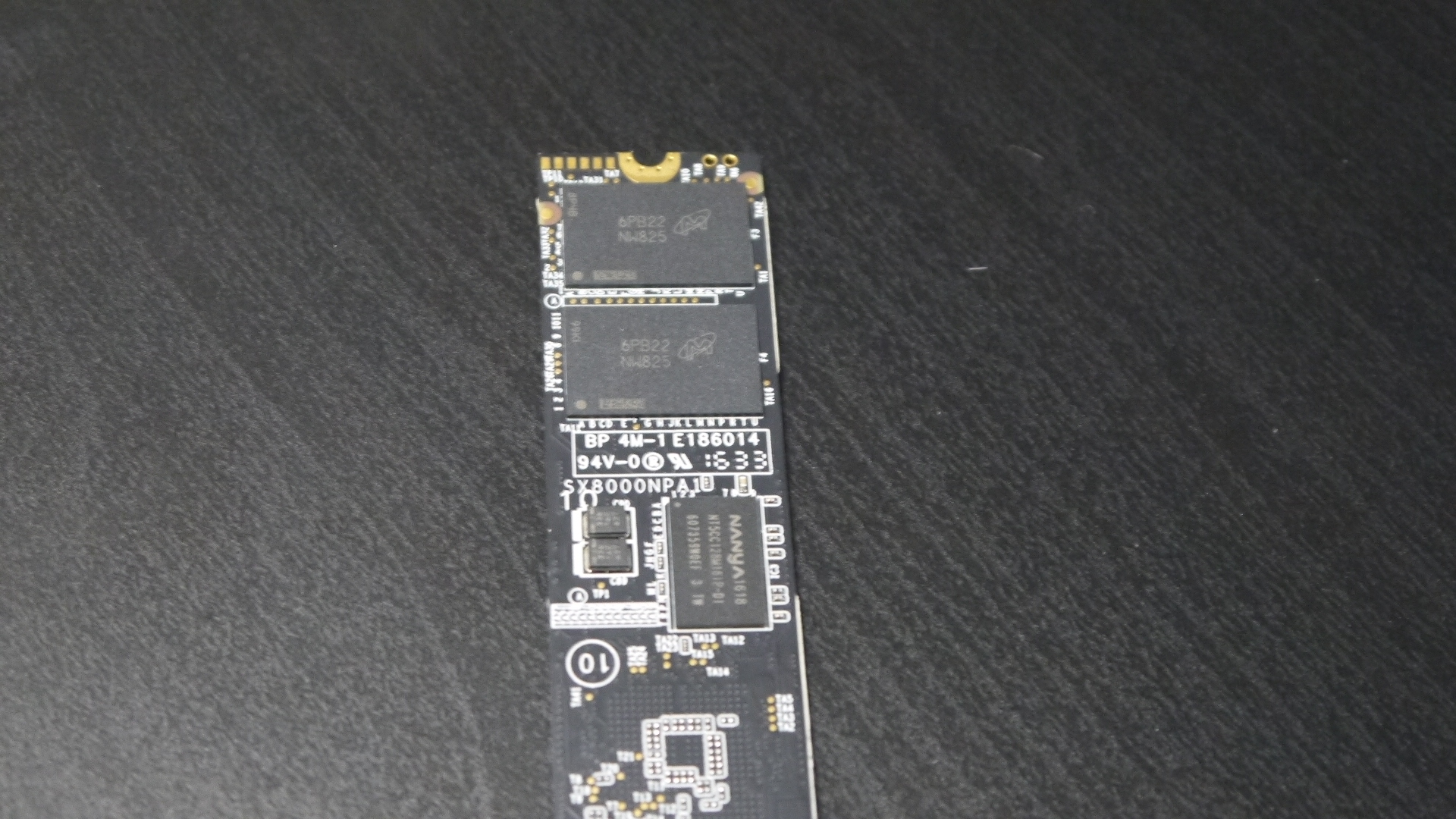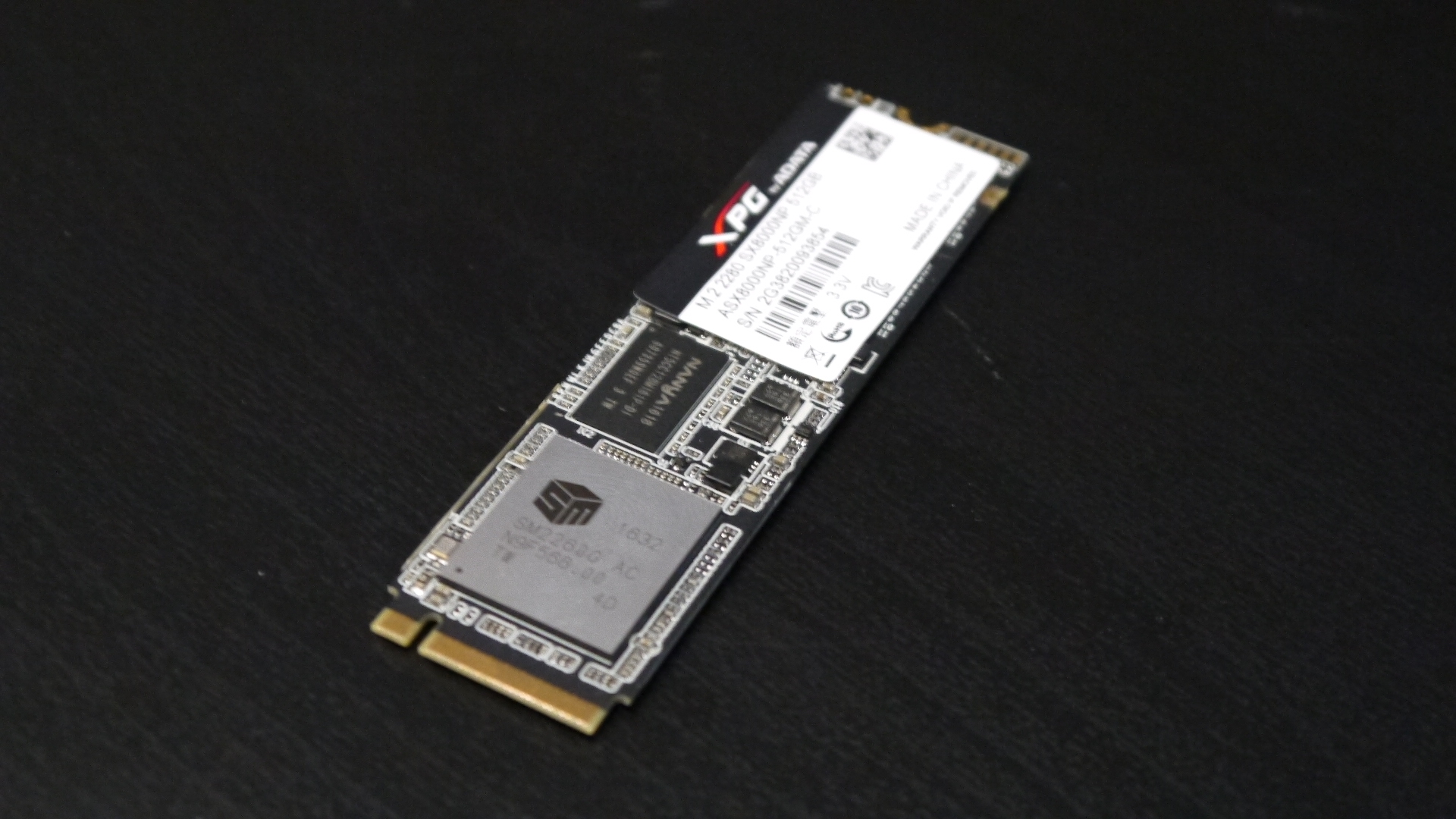TechRadar Verdict
Adata proves that it’s not just big names like Samsung, Intel or Toshiba that can making incredibly fast NVMe M.2 drives. For gamers and professionals, this is an amazing upgrade, but it does come with a high price tag.
Pros
- +
Very fast
- +
Range of capacities
- +
Long warranty
- +
Great selection of features
Cons
- -
Still expensive
- -
Not quite as fast as some of its competitors
- -
The ‘aimed at gamers’ branding may put people off
Why you can trust TechRadar
The Adata XPG SX8000 512GB is an SSD that uses the faster PCIe NVMe interface and M.2 form factor that puts regular SSDs that rely on the older and slower SATA 3 connection in a PC’s motherboard to shame.
Along with SSDs such as the Samsung NVMe SSD 960 Pro M.2 and the Toshiba OCZ RD400 512GB SSD that utilise this newer interface, the Adata SX8000 is not held back by SATA 3, which often bottlenecks performance on regular SSDs.
That’s why we’re seeing many SATA 3 SSDs usually benchmark around the 530MB/s read and 520MB/s write sequential speeds – whereas M.2 drives can hit much faster speeds, with Adata promising incredibly impressive rates of 2400MB/s read and 1000MB/s write.

Of course, such performance gains come at a price, and these drives often cost a fair bit more than standard SSDs – and a lot more than traditional hard drives. The Adata XPG SX8000 512MB version (which we test here) goes for £252.37 (around $315, AU$425), and it also comes in 128GB and 256GB sizes, with a 1TB capacity launching soon.
This is an expensive drive then, and it’s part of Adata’s XPG line, which is targeted for gamers and enthusiasts. The high price tag will put many people off, but the promised speed increases, and other features, means that this will still be a very attractive upgrade to people who are serious about speeding up their machines.
These drives can be installed in most modern PC motherboards, either through the M.2 port or in a PCIe 3.0 port (using an adapter), and many laptops allow for M.2 hard drives as well.
While Samsung and Toshiba focus on high-end M.2 SSDs, the Adata XPG SX8000 512GB is aimed at the lower end of the market. This is a tricky place to be, as it’s getting increasingly crowded, and a ‘low price’ for a PCIe NVMe SSD is still very expensive for most people. The Adata XPG SX8000 512GB needs to do something very special to persuade people to buy it, rather than spend more money on Samsung or Toshiba’s offerings.
Sign up to the TechRadar Pro newsletter to get all the top news, opinion, features and guidance your business needs to succeed!

Features and specifications
As we mentioned earlier, the Adata XPG SX8000 512GB has promised sequential read and write speeds of 2,000MB/s and 1,000MB/s respectively. If you go for a lower capacity version then these speeds drop – with the 128GB version promising 1,000MB/s and 300MB’s, while Adata claims the 256GB version can reach speeds of 1,900MB/s and 600MB/s. If you want even more speed, then the 1TB version is promised to reach 2,400MB/s and 1,000MB/s.
These transfer rates are thanks to the NVMe 1.2 interface, and Adata has made the XPG SX8000 512GB the first drive to include 3D MLC NAND. This allows it to reach capacities up to 1TB on the small and compact M.2 form factor, while also increasing reliability and efficiency.
While the Adata XPG SX8000 512GB is targeted at gamers (who should experience significantly improved load times for games installed on the drive, as well as better texture streaming and other performance benefits), non-gamers and professionals should also see plenty of performance improvements as well. The lower power consumption (and thus reduction in heat emitted) will be useful to always-on servers and workstations, and the Adata XPG SX8000 512GB makes use of LDPC ECC (low density parity check error correction) which helps make sure data you store on the drive is safe from corruption, while the drive is also backed by a 5 year limited warranty. It has a MTBF (mean time between failures) of 2,000,000 hours – which makes this a very reliable drive compared to similar SSDs.
Intelligent SLC Caching for helping the drive operating in a faux single-level cell mode for increased speeds, and DRAM Cache Buffer, keep the data flow rate fast and consistent.
Overall, the features and promised speeds of the Adata XPG SX8000 512GB makes it a very attractive SSD for both gamers and professional users alike.
Performance
So how does the Adata XPG SX8000 512GB perform compared to its impressive promises? In fact, it did well, with CrystalDiskMark test results of 2430MB/s read and 1200MB/s write, a welcome (and rare) example of a drive actually reaching speeds higher than those advertised.
This is undeniably impressive, but it doesn’t quite reach the speeds of the Toshiba OCZ RD400 512GB SSD (2606MB/s read and 1444MB/s write) or the Samsung NVMe SSD 960 Pro M.2 (3480MB/s read, 2100MB/s write).
So it doesn’t quite keep up with the big boys of NVMe SSDs, but it still holds its own, especially when you compare it to a standard SATA 3 SSD, such as Adata’s own Ultimate SU800 SSD, which reached 562MB/s read and 515MB/s write speeds.
For many people the speed differences between the Adata XPG SX8000 512GB and its more expensive competitors won’t be particularly noticeable – while the leap from a standard SSD to the SX8000 will be much more impressive, so we wouldn’t discount the Adata XPG SX8000 512GB just because it’s ‘only’ amazing fast, compared to unbelievably fast.

Matt is TechRadar's Managing Editor for Core Tech, looking after computing and mobile technology. Having written for a number of publications such as PC Plus, PC Format, T3 and Linux Format, there's no aspect of technology that Matt isn't passionate about, especially computing and PC gaming. He’s personally reviewed and used most of the laptops in our best laptops guide - and since joining TechRadar in 2014, he's reviewed over 250 laptops and computing accessories personally.
